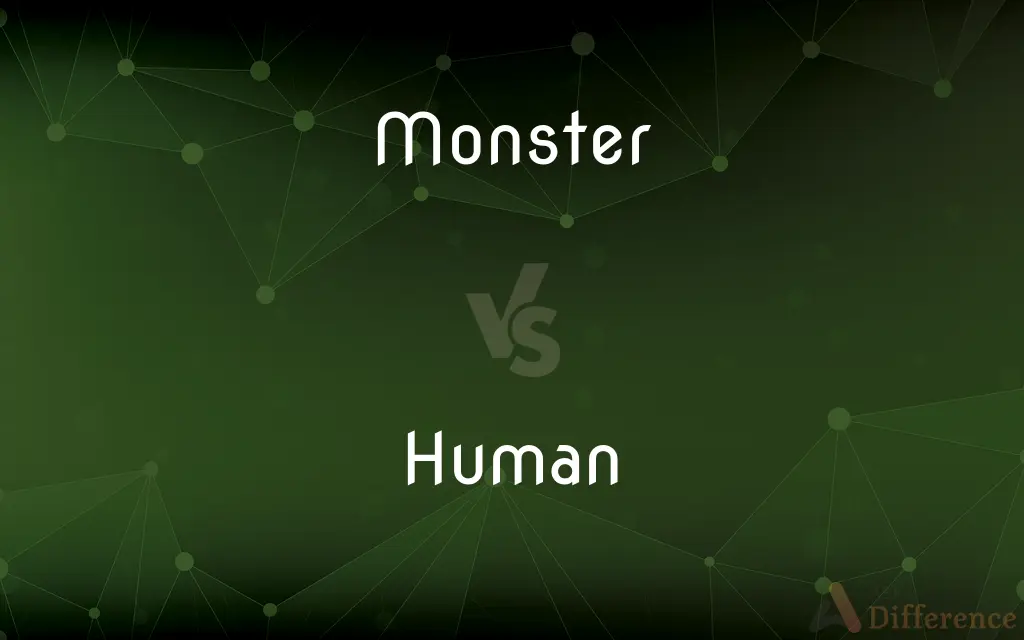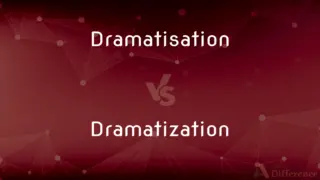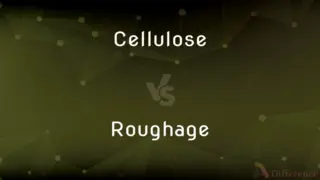Monster vs. Human — What's the Difference?
Edited by Tayyaba Rehman — By Maham Liaqat — Updated on April 24, 2024
Monsters are often depicted as mythical or supernatural creatures with frightening features, whereas humans are real, biologically distinct beings known for their intelligence and social structures.

Difference Between Monster and Human
Table of Contents
ADVERTISEMENT
Key Differences
In folklore and mythology, monsters are typically portrayed as beings or creatures that are physically or morally frightening, often with supernatural origins or abilities. They are used to symbolize chaos, fear, or the unknown. On the other hand, humans are known for their ability to reason, communicate complex ideas through language, and build societies, which are grounded in the real world and scientific understanding.
While monsters in stories and media are often designed to elicit fear or serve as antagonists, they can also represent internal or external conflicts that humans face. In contrast, humans in narratives are usually the protagonists or characters with whom the audience is meant to identify, highlighting their struggles, achievements, and growth.
The concept of a monster is versatile in cultural significance, often used to embody moral lessons or societal fears. Humans, however, are depicted in a vast array of roles that reflect the complexity and diversity of real-life human nature and social dynamics.
Monsters are usually fictional creations without any basis in natural biology, often breaking the laws of nature in their design and abilities. Humans, conversely, are subjects of biological and social sciences, studied in various fields like anthropology, psychology, and medicine.
In terms of symbolism, monsters are often used to explore the boundaries of what is considered morally or socially acceptable, pushing against norms and provoking thought about right and wrong. Humans, though capable of monstrous actions, are usually portrayed with a potential for morality, change, and redemption.
ADVERTISEMENT
Comparison Chart
Nature
Mythical, often supernatural.
Real, biological entities.
Role in Stories
Antagonists, symbols of fear.
Protagonists, complex characters.
Cultural Significance
Embody fears, moral lessons.
Reflect societal norms and values.
Scientific Basis
Fictional, not based on natural laws.
Studied extensively in various sciences.
Symbolism
Challenges norms, explores taboos.
Potential for morality and redemption.
Compare with Definitions
Monster
A symbol of fear or moral corruption in literature and cinema.
The creature in the novel symbolized the monster of greed.
Human
A subject of social, psychological, and biological study.
Human behavior is a key topic in psychology.
Monster
An antagonist in many horror and fantasy stories.
The villagers fought the monster to save their town.
Human
Reflective of the moral and ethical dimensions of society.
The documentary highlighted human resilience in the face of disaster.
Monster
A creature that is typically large, ugly, and frightening.
The monster lurked in the shadows.
Human
A person; being that is capable of complex emotional and intellectual behavior.
Every human has the right to freedom and safety.
Monster
A mythical creature that embodies supernatural qualities or abilities.
Dragons are often depicted as monstrous beings with the ability to breathe fire.
Human
A character in literature and art representing real-life traits and emotions.
The novel explores the depths of human suffering and joy.
Monster
An extraordinary or daunting person or thing.
He's a monster on the guitar, playing incredibly complex solos.
Human
A member of the species Homo sapiens, characterized by bipedalism and complex brain development.
Humans are capable of abstract reasoning.
Monster
A large, ugly, and frightening imaginary creature
A monster with the head of a hyena and hindquarters of a wolf
A world of fable, inhabited by other-worldly monsters
Human
Humans (Homo sapiens) are the most abundant and widespread species of primates, characterized by bipedality and large, complex brains enabling the development of advanced tools, culture and language. Humans are highly social beings and tend to live in complex social structures composed of many cooperating and competing groups, from families and kinship networks to political states.
Monster
A thing of extraordinary or daunting size
This is a monster of a book, almost 500 pages
A monster 36lb carp
Human
Relating to or characteristic of humankind
The human body
The complex nature of the human mind
Monster
A congenitally malformed or mutant animal or plant.
Human
A human being.
Monster
Criticize or reprimand severely
My mum used to monster me for coming home so late
Human
A member of the primate genus Homo, especially a member of the species Homo sapiens, distinguished from other apes by a large brain and the capacity for speech.
Monster
An imaginary or legendary creature, such as a centaur or Harpy, that combines parts from various animal or human forms.
Human
A person
The extraordinary humans who explored Antarctica.
Monster
A creature having a strange or frightening appearance.
Human
Of, relating to, or characteristic of humans
The course of human events.
The human race.
Monster
(Archaic) An organism that has structural defects or deformities.
Human
Having or showing those positive aspects of nature and character regarded as distinguishing humans from other animals
An act of human kindness.
Monster
(Informal) A very large animal, plant, or object.
Human
Subject to or indicative of the weaknesses, imperfections, and fragility associated with humans
A mistake that shows he's only human.
Human frailty.
Monster
One who inspires horror or disgust
A monster of selfishness.
Human
Having the form of a human.
Monster
(Informal) Extremely large; monstrous
A monster hit at the box office.
Ate a monster steak.
Human
Made up of humans
Formed a human bridge across the ice.
Monster
A terrifying and dangerous creature. Category:en:Horror
Human
(notcomp) Of or belonging to the species Homo sapiens or its closest relatives.
Monster
A bizarre or whimsical creature.
The children decided Grover was a cuddly monster.
Human
(comparable) Having the nature or attributes of a human being.
To err is human; to forgive, divine.
Monster
A cruel, heartless, or antisocial person, especially a criminal.
Get away from those children, you meatheaded monster!
Human
(narrowly) The tallest, most abundant and most intelligent of primates; Homo sapiens.
Humans share common ancestors with other apes.
Monster
A severely deformed person.
Human
(broadly) Any hominid of the genus Homo.
Monster
(figuratively) A badly behaved child, a brat.
Sit still, you little monster!
Human
(rare) To behave as or become, or to cause to behave as or become, a human.
Monster
(informal) Something unusually large.
Have you seen those powerlifters on TV? They're monsters.
Human
Belonging to man or mankind; having the qualities or attributes of a man; of or pertaining to man or to the race of man; as, a human voice; human shape; human nature; human sacrifices.
To err is human; to forgive, divine.
Monster
(informal) A prodigy; someone very talented in a specific domain.
That dude playing guitar is a monster.
Human
A human being.
Sprung of humans that inhabit earth.
We humans often find ourselves in strange position.
Monster
(gaming) A non-player character that player(s) fight against in role-playing games.
Human
A human being;
There was too much for one person to do
Monster
(informal) Very large; worthy of a monster.
He has a monster appetite.
Human
Any living or extinct member of the family Hominidae
Monster
(informal) Great; very good; excellent.
Human
Characteristic of humanity;
Human nature
Monster
(transitive) To make into a monster; to categorise as a monster; to demonise.
Human
Relating to a person;
The experiment was conducted on 6 monkeys and 2 human subjects
Monster
(intransitive) To behave as a monster to; to terrorise.
Human
Having human form or attributes as opposed to those of animals or divine beings;
Human beings
The human body
Human kindness
Human frailty
Monster
To harass.
Monster
To play (a series of) non-player characters as directed, without having the responsibility of organising the game itself; generally not limited to playing literal monsters or hostile combatants.
Are you monstering that event?
Monster
Something of unnatural size, shape, or quality; a prodigy; an enormity; a marvel.
A monster or marvel.
Monster
Specifically , an animal or plant departing greatly from the usual type, as by having too many limbs.
Monster
Any thing or person of unnatural or excessive ugliness, deformity, wickedness, or cruelty.
Monster
Monstrous in size.
Monster
Enormous or very powerful.
Monster
To make monstrous.
Monster
An imaginary creature usually having various human and animal parts
Monster
Someone or something that is abnormally large and powerful
Monster
A person or animal that is markedly unusual or deformed
Monster
A cruel wicked and inhuman person
Monster
(medicine) a grossly malformed and usually nonviable fetus
Common Curiosities
Are all monsters evil?
Not all monsters are depicted as evil; some are shown as misunderstood beings or victims of circumstance, challenging the traditional notion of monstrosity.
What role do humans play in understanding monsters?
Humans create and perpetuate the concept of monsters, using them as tools to explore themes of fear, morality, and the unknown.
What are the key characteristics of humans?
Humans are known for their complex brain functions, including reasoning, emotional depth, and the capacity for language and culture.
What makes humans unique from other animals?
Humans are unique in their advanced cognitive abilities, use of complex language, and development of widespread cultural and technological advancements.
Are monsters real?
While creatures that might be considered monstrous exist in nature, the monsters of folklore and mythology do not exist in reality.
Can humans be considered monsters?
In a metaphorical sense, humans can be considered monsters when they commit acts that are widely regarded as morally reprehensible.
Why are monsters important in storytelling?
Monsters are important in storytelling for their ability to evoke strong emotional responses and represent larger than life challenges.
What defines a monster?
A monster is typically defined as a mythical or supernatural creature that embodies fear or evil, often with grotesque or formidable features.
How are monsters used in literature?
In literature, monsters are often used to symbolize personal or societal fears, challenge heroes, or serve as metaphors for internal struggles.
How has the portrayal of monsters evolved over time?
The portrayal of monsters has evolved from purely evil entities to more nuanced characters that can possess redeeming qualities or invoke sympathy.
How do cultures differ in their depiction of monsters?
Different cultures depict monsters in various ways, often reflecting unique fears, moral values, and historical contexts.
What is the significance of monsters in modern media?
In modern media, monsters often serve as compelling antagonists or complex characters that drive plots and explore themes of difference and otherness.
What ethical concerns arise from labeling people as monsters?
Labeling people as monsters can dehumanize them, justify mistreatment, and oversimplify complex moral or psychological issues.
How does studying humans help us?
Studying humans helps in understanding behavior, improving societal structures, and enhancing health and wellbeing.
How do children typically react to monsters?
Children may initially react to monsters with fear, but through stories, they can learn to understand and manage their fears.
Share Your Discovery

Previous Comparison
Dramatisation vs. Dramatization
Next Comparison
Cellulose vs. RoughageAuthor Spotlight
Written by
Maham LiaqatEdited by
Tayyaba RehmanTayyaba Rehman is a distinguished writer, currently serving as a primary contributor to askdifference.com. As a researcher in semantics and etymology, Tayyaba's passion for the complexity of languages and their distinctions has found a perfect home on the platform. Tayyaba delves into the intricacies of language, distinguishing between commonly confused words and phrases, thereby providing clarity for readers worldwide.














































